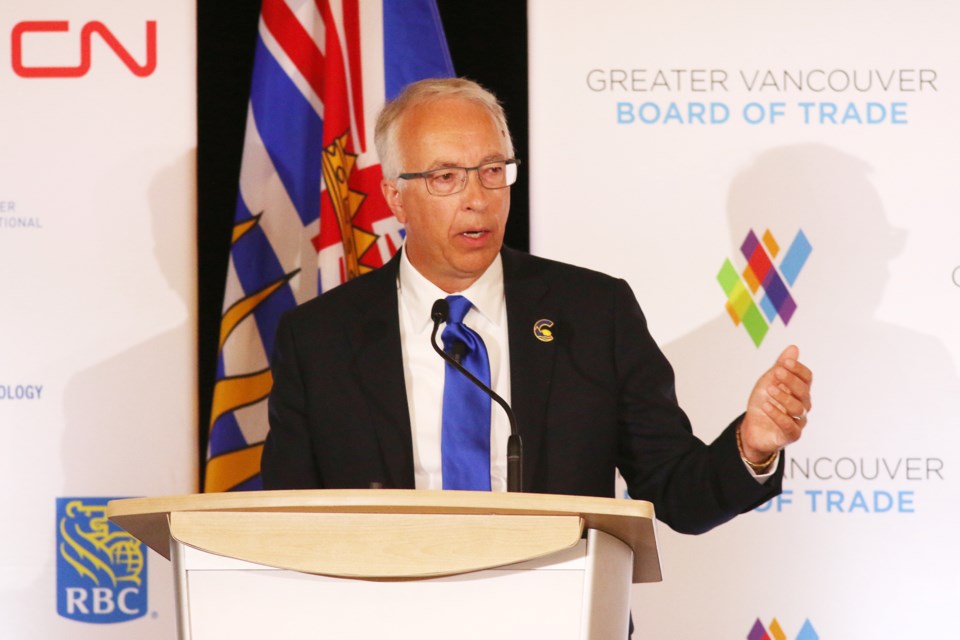A Conservative government would be “laser focused” on creating jobs and revitalizing ÎÚÑ»´«Ã½’s flagging economy, Conservative Party of ÎÚÑ»´«Ã½ Leader John Rustad said Wednesday at a Greater Vancouver Board of Trade (GVBOT) leaders luncheon.
To that end, it would cut red tape and taxes – notably the provincial carbon tax – address the growing concerns businesses have with drugs and petty and violent crime, and remove economic barriers faced by ÎÚÑ»´«Ã½'s resource sector, notably forestry.
Rustad has been hammering new planks to his party’s platform on a daily basis for weeks now, so there was not much new for him to announce at Wednesday’s leaders' lunch.
Some of Rustad’s previously announced pledges would, if fulfilled, constitute some fairly radical reforms. They include:
- repealing the carbon tax and low carbon fuel standard;
- opening ÎÚÑ»´«Ã½ to nuclear power;
- replacing ÎÚÑ»´«Ã½'s stumpage charge on timber with a value-added tax;
- reducing permitting red tape with a “one project, one permit” process; and
- providing a renters and homeowners rebate through exemptions to ÎÚÑ»´«Ã½ income tax
The latter policy would exempt up to $3,000 a month in rental or mortgage interest costs from provincial income taxes for renters and homeowners.
It would start by exempting $1,500 per month in the 2026 budget and increase it by $500 per year to $3,000 per month. The Conservatives estimate the cost to government of the policy would be $900 million.
For many small businesses in ÎÚÑ»´«Ã½, drugs and crime are a pressing campaign issue. The Eby government’s decriminalizing of hard drugs has been criticized by the Conservatives as a failure.
Rustad has vowed to reverse the NDP’s drug liberalization policies, including making hard drugs illegal again and ending safe supply programs.
Rustad said a Conservative government would push the federal government for minimum sentencing for repeat offenders, and put more focus on drug addiction treatment.
"When you talk to a mom whose child has lost his life to addiction, and who fought through the system, fought to get help and was not getting help, that to me is a failure of government," he said. "We need to do everything we can to have a path to get people healthy and an opportunity to recover."
Rustad pointed to a steep decline in ÎÚÑ»´«Ã½'s forest sector as evidence that things are not well with ÎÚÑ»´«Ã½’s economy.
“We are the highest cost producers,” he said of the forestry sector. “Two-thirds of the forest sector has been decimated under the current government.”
Rustad has vowed to cut some of the red tape that results in things like delays in getting cutting permits, and replace the stumpage system in ÎÚÑ»´«Ã½ with a value-added tax.
The NDP government’s climate change policies include plans to electrify the economy, with electric vehicles electrifying transportation and heat pumps electrifying homes. But that electrification plan would require much more power than ÎÚÑ»´«Ã½ plans to build, Rustad suggested.
“That means we’re going to have to have a conversation about nuclear power,” Rustad said. “Should we have that as part of our mix in British Columbia?”
On immigration and the need for skilled workers, Rustad said ÎÚÑ»´«Ã½ should be assuming more control on immigration.
“We shouldn’t be relying on Ottawa, 3,000 miles away, making those decisions,” he said. “We should take control of immigration right here in British Columbia.”
GVBOT CEO Bridgitte Anderson challenged Rustad on a recent pledge that a Conservative government would not increase taxes without approval by referendum.
“I would like to know who would likely vote for a tax increase,” Anderson said. “Why did you take that position?"
“Right now, governments of all stripes have been treating people in this province like a piggy bank,” Rustad answered. “We need to say enough is enough.”
Asked if a Conservative government would review the employer health tax -- which essentially shifted the burden for health care premiums from citizens to employers -- Rustad made no specific promises.
“We’re going to look at all components that are adding to the costs of business," he said.



